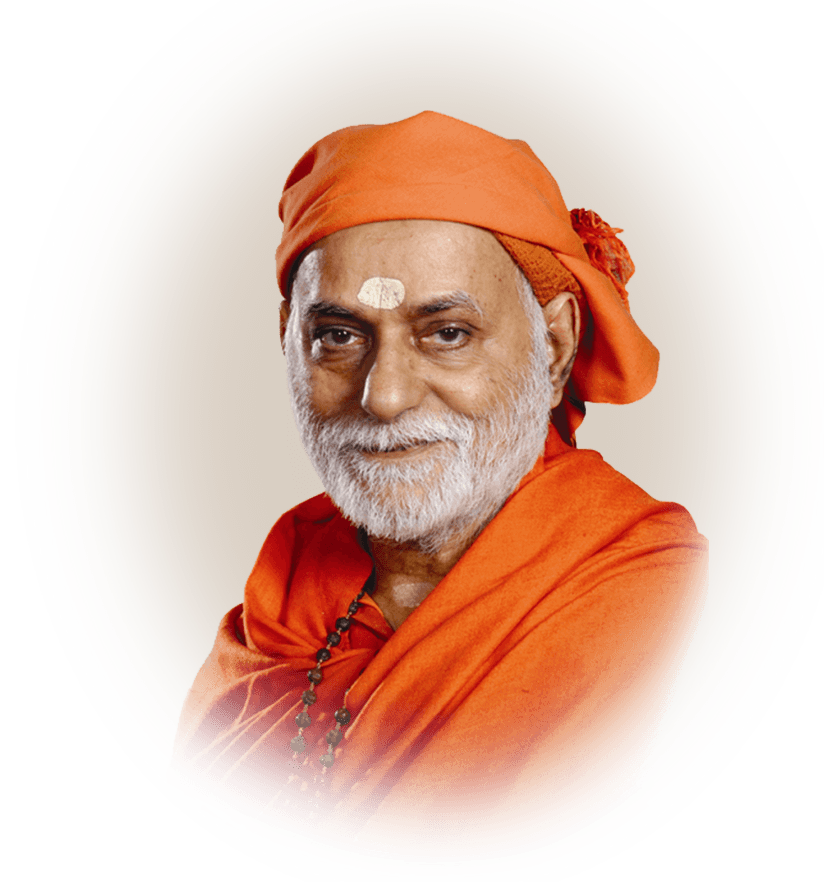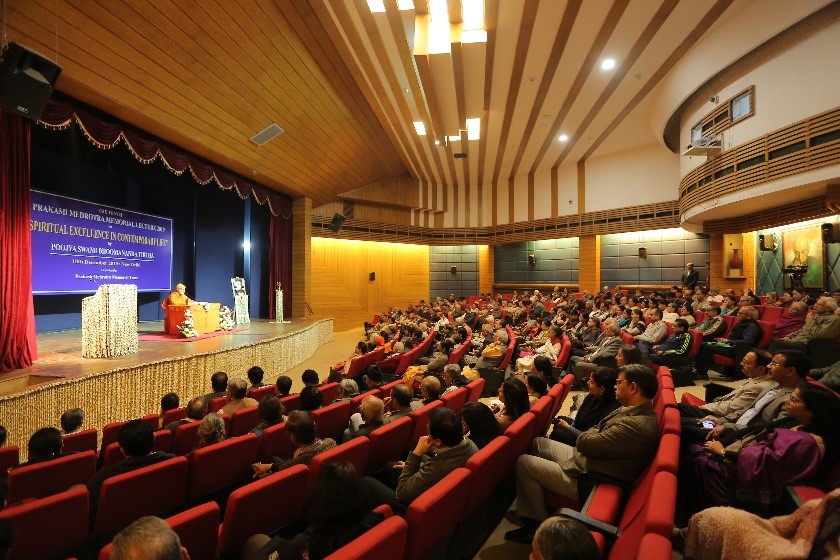Swami Bhoomananda Tirtha

Expansive Personality
“Spiritual wisdom is aimed at making the mind light, the intelligence clear and the ego extinct, resulting in dawning of an illumined and expansive personality.”
– Poojya Swamiji
Poojya Swamiji is the Founder Saint of Narayanashrama Tapovanam and Centres for Inner Resources Development (CIRD). Swamiji belongs to the Tirtha lineage instituted by Shankaracharya, and received Brahmavidyā initiation from Baba Gangadhara Paramahamsa of Dakshinkhanda (West Bengal). After a period of intense sādhanā he embraced sannyasa at the age of 23.
Expansive Personality
“Spiritual wisdom is aimed at making the mind light, the intelligence clear and the ego extinct, resulting in dawning of an illumined and expansive personality.”
– Poojya Swamiji
Sannyaasin Disciples of Poojya Swamiji
-
 Swami Nirviseshananda Tirtha
Swami Nirviseshananda Tirtha -
 Ma Gurupriya
Ma Gurupriya
Poojya Swamiji’s unique message to the world:
- The focus of Bhakti-yoga is not God but devotee’s own mind and behaviour, which have to be embellished with devotional qualities.
- The meaning of Karma-yoga is not getting engaged in more and more activities, but to cultivate the yoga-orientation of the mind.
- The purpose of Jnāna-yoga is not just to gain spiritual knowledge but to pursue self-transformation through contemplation on the Truth.
Hence, whatever path we may follow, we must shift our focus from the external God to our own mind. Poojya Swamiji exhorts us to transform every moment of our life into spiritual sādhanā by purifying the mind through two-fold practice:
Meditative Introspection
Through meditation and scriptural contemplation on the Truth, the seeker has to discover his Real Identity. In the process, he realizes the true nature of the mind as well as our world-perception. He discovers that the source of joy and fulfilment lies within, not outside.
Interactional Sādhanā
It is the ceaseless practice of shifting focus from external situation to mind’s response to it and treating the mind with knowledge, so that any interaction will lead to inner expansion, enrichment and freedom, instead of stress, anxiety and bondage. It aims to transform every moment of wakeful life into spiritual pursuit.
“Rather than running away from life and interactions in search of Divinity,” Poojya Swamiji says, “we must make all our life and interactions divine by this wholesome two-fold sādhanā.”
Poojya Swamiji has been disseminating the eternal knowledge for past 65 years. His presentation of Bhagavad Gita as an “Administrative Gospel”, and his unique interpretation of Srimad Bhagavatam, Upanishads, Yoga-vaasishtha Ramayana, Ashtavakra Samhita, Vivekachudamani, and other spiritual texts, coming from his experiential depth and mastery of Self-realization, have transformed the life of many seekers on the path of spiritual awakening and fulfilment.
Foundation for Restoration of National Values (FRNV)
Poojya Swamiji’s focus has always been on cultivation of Values to empower the individual and integrate the society. His greatest concern has been the present crisis of value decline in our country. In 2007, he started seriously contemplating on launching a value restoration movement. The subject was discussed in Delhi with the members of CIRD-Delhi, and “Foundation for Restoration of National Values” (FRNV) was registered as an independent society in June 2008 with Padma Vibhushan E Sreedharan (also known as “Metro Man” ) as the Chairperson.Through introduction of pilot projects on value education, environmental protection, and petitioning the Supreme Court on various national issues, the primary aim of FRNV has been:
- To transform and persuade the national leaders to address the crisis of value decline.
- To grow love and respect for our country and her universal Cultural Values.
- To bring about changes in the mind and intelligence of people, the root cause of the crisis.
Rural Upbringing and Discipline
“All of you should know how a village can shape an individual’s life, instituting cultural and spiritual dimensions of this great Nation. The so-called modernists should remember with respect and humility that proper growth of individuality takes place through this kind of cultural allegiance and discipline.”
Early Life
Poojya Swamiji was born on 13th May 1933 in an orthodox Brahmin family in Paralikkad village, near Wadakanchery, Thrissur district, Kerala, not far from Kalady, the birthplace of Adi Shankaracharya. His mother was a pious housewife who imparted to the children cultural traditions, religious austerity and value for education and charity. Many of the Sanskrit verses Swamiji chants today, he had learnt in early childhood from his ‘illiterate’ mother. However, the ‘illiterate’ mother was the daughter of a Sanskrit scholar, a saintly person.
Every morning, after taking bath in the temple tank and putting vibhooti (sacred ash) stripes all over the body in the traditional style, young Swamiji would go to the temple wearing wet towel to do soorya-namaskāra (prostration to the sun) chanting “Sooryam sundara-lokanātham-amṛtam …” as taught by his mother. In the beginning he was doing 21 to 51 times. Gradually the number increased to hundreds and even a thousand on Sundays. This practice was a great tapas (austerity) in Swamiji’s life, prompted and motivated by the cultural heritage of his parents and the devotional ambience of Paralikkad village.
• (L) Temple tank in Poojya Swamiji’s childhood village where he used to take bath.
• (R) The Arali tree, where Swamiji used to do Soorya-namaskāra, is still adorning the place as a living witness.
• (T) Temple tank in Poojya Swamiji’s childhood village where he used to take bath.
• (B) The Arali tree, where Swamiji used to do Soorya-namaskāra, is still adorning the place as a living witness.
Expansive Personality
“Spiritual wisdom is aimed at making the mind light, the intelligence clear and the ego extinct, resulting in dawning of an illumined and expansive personality.”
– Poojya Swamiji
Spiritual Unfoldment
The singular event that led Poojya Swamiji from religious faith and traditional practices to the world of unfettered spiritual discoveries, was meeting his Gurudev Baba Gangadhara Paramahamsa.
Earlier in his life Poojya Swamiji had never heard about Self-realization. Neither did he have any idea of the wonderful role of a spiritual Guru – and the wholesome trust, refuge, and love associated with Guru- śishya relationship – in the unfoldment and fulfilment of a seeker’s life.
The sincerity with which he pursued the religious austerities, now after Brahmavidyā deeksha (initiation), he got immersed in intense meditative absorption with that same dedication.
As the flame of sādhanā became more and more brilliant every day, and the voice of Upanishads echoed in full vigour, thirst for Sannyāsa (renunciation) became insatiable. Swamiji always says that Sannyāsa is not breaking away from the family relationships or banishing the loved ones from one’s “own” sphere. It is an expansion to own up everybody, a call to embrace the whole world. For such a person, the Upanishad says, the whole world becomes a single nest or abode.
As years passed, Poojya Swamiji’s focus shifted from Dhyāna nishtha (dedication to meditation) to Jnāna-nishtha (dedication to knowledge). This exclusive knowledge-orientation made him a sane, natural human being, free of various saintly insignia or ecstatic eccentricities.
• (L) Poojya Swamiji with Baba; (C) As a young sannyasin;(R) Absorbed in meditation.
• (T) Poojya Swamiji with Baba; (C) As a young sannyasin;(B) Absorbed in meditation.
(From “A Great Association”)
Making of an Institution
In April 1964, Poojya Swamiji along with Mataji Sulabha Devi and a few devotees founded Narayanashrama Tapovanam on a 3.5-acre land on the picturesque eastern slope of the Pandavagiri Hill (Venginissery, Thrissur District).
The Ashram was a true forest hermitage where life was extremely simple and austere. A small mud-cottage with tiled roof and woven coconut fronds for its doors and shutters. The walls and floor remained un-plastered for years. The cottage was surrounded by steep irregular hilly terrain. Heavy rains would suddenly bring streams of gushing water. Sometimes in the night, Poojya Swamiji would go with a spade and umbrella to divert the torrential flow of water.
Only source of income for the Ashram was Rs 25 per month sent by Parvati Ammal’s son. Mataji Sulabha Devi had the task of preparing food. She would pluck edible leaves from the surrounding areas and prepare vegetable for the day. There were days when Mataji could not prepare a full meal for the inmates. Once when asked, Swamiji said:
“Did we starve any time in the Ashram? Yes, we did, though not for many days… I had planted 12 coconut seedlings in front. I used to draw water from the well using a bucket and rope, fill two mud-pitchers and carry them down to each plant daily in the morning…
That day’s watering was over in the morning. Two days without food I was feeling weak; wondered whether next day with a starving stomach I would be able to water the plants as usual! So, after dusk, when visibility was still there, I drew water and filled the pots. Going to each plant I said: “Here is the water for tomorrow. I am not sure whether I would be able to wet your roots tomorrow. What would be the fate thereafter, I cannot say.”
• Poojya Swamiji with devotees in front of old buildling; Centre pic: with Mataji Sulabha Devi.
“ Decades back, I happened to see an old man in Calcutta (Kolkata). I did not know that he was a Knower or a Saint. But I liked him immensely. As I got up after prostration, the old man held my head lovingly in his hands and kissed my forehead. This was the beginning of my relationship with Baba.”
– Poojya Swamiji
“Genesis of a Mahatma. …Whenever the country had been passing through a dark phase of ignorance and inertia, whenever greed for material possession and over-indulgence in sensory pleasure threatened to disintegrate the society, whenever religious practices and rituals became stale ostentation and socio-political bigotry overpowered the lofty universal values, great spiritual personalities arrived to revitalize the society with universal love and pristine spiritual power.”
(from “A Great Association”)
Loka-sangraha means: “lokasya unmārga-pravṛtti-nivāraṇam”. It is the effort to keep society on the auspicious path by removing the degenerative tendencies. The best and the most long-lasting service to mankind is to integrate the society through love and enlightenment.
The focus of Poojya Swamiji’s relentless loka-sangraha mission over the past six decades has been to make people understand that the real purpose of all religious as well as spiritual practices is to purify and transform our own mind.
“As the world is a manifestation of God, loka-sangraha (a Knower’s effort to bring people on the auspicious path) is the creative manifestation of spiritual Wisdom.” – Poojya Swamiji
Jnāna Yajna – Knowledge Dissemination Programmes
- Jnāna Yajna consists of Knowledge dissemination programmes through series of public discourses, workshops, retreats, sessions for youth and professionals, and living in the association of the Knower. These are held every year in different parts of the world organized by the Ashram and the CIRDs. All the lecture programmes are now livestreamed for the benefit of viewers all over the world.
- GBGC
This Convention aims to bring the universal message of Bhagavad Gita to people across the world. Held in reputed universities in East and West Coasts of USA from 2017-2019, and online in 2020, the programme evoked great interest and inspiration in the attendees. - SBTSS
10-day Knowledge Festival, in which Saints and Scholars explain how the essential values of Śreemad Bhāgavatam can be applied to daily life. Thousands of devotees from rural and urban areas participate in this programme, which concludes with a grand Vishnusahasranama Archana and Yajna. - ATS
Annual 8-day public discourse series conducted by Poojya Swamiji in Thrissur town (Sri Moolasthanam in front of Vadakunathan Shiva Temple) since 1996. After completing Bhagavad Gita in 2013, Swamiji is now exposing Ashtavakra Samhita.

Public Discourse in Delhi 2019
Social and religious reformation
Poojya Swamiji’s love for values has made his Saintly life intensely involved in a number of mass movements and legal campaigns (during 1985 to 2005) to reform society and remove degenerative practices from religious institutions.
He is actively involved in petitioning the courts against torturing of temple elephants and illegal hill cutting.

Details of Swamiji’s socio-religious movements are vividly described in the book “A Great Association” authored by Nutan Swamiji.
“To seek Self-knowledge is not to be inactive or less useful to the world. In fact, a Knower demonstrates the ideal way of action.” – Poojya Swamiji
Distribution of food, clothing, medical and educational aids
- Annual distribution of rice and clothing/blankets to indigent families in a large scale in Kerala as well as around CIRD-Delhi, CIRD-Jamshedpur, and tribal areas in Jharkhand. About thirty-eight thousand families got benefited in 2019
- Flood and Covid 19 pandemic relief
- Regular and monthly support for Village Welfare
The main purpose of arranging these Dāna programmes has been to grow societal awareness and equality in the minds of people and give them the joy of expansion and fellow-feeling transcending the various caste and community barriers. In all these programmes, Poojya Swamiji’s focus has been to welcome the recipients with love and honour, and grow in the giver a sense of gratitude for getting an opportunity to share their fortune.
Expansive Personality
“Spiritual wisdom is aimed at making the mind light, the intelligence clear and the ego extinct, resulting in dawning of an illumined and expansive personality.”
– Poojya Swamiji




















